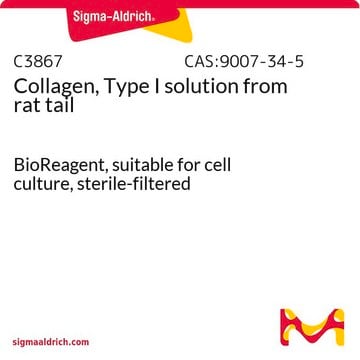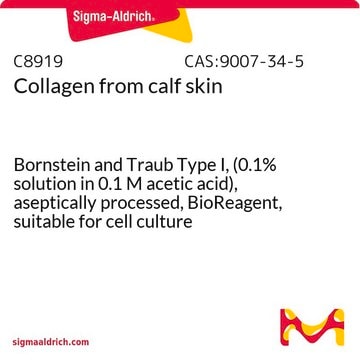L7220
Collagen A
Synonyme(s) :
Collagen A
About This Item
Produits recommandés
Source biologique
bovine (calf) skin
Forme
liquid
Conditionnement
pkg of 6 x 5 mL ×
Concentration
1 mg/mL
Technique(s)
cell culture | mammalian: suitable
Conditions d'expédition
ambient
Température de stockage
2-8°C
Vous recherchez des produits similaires ? Visite Guide de comparaison des produits
Description générale
Notes préparatoires
The Collagen molecules remain monomeric in solution at a pH below 3.8 and lower ion concentration, there is no fibril formation.
We recommend two different coating systems, depending on when you need the culture flasks: either for immediate use after production or after a longer storage period.
To use the culture flask immediately:
- Mix 1 ml Collagen A (cat. no. L7220) with an equal volume of ultra-pure water or with 1x PBS, adjusted to a pH of 3.0 - 3.5. The PBS solution (cat. no. L1815) is adjusted to a pH of 3.0 - 3.5 as follows: Add 1 ml 1 N HCl to 100 ml PBS solution.
- Add 2 ml of the diluted Collagen solution per 10 cm2 area of culture flask and incubate for 2 - 3 hours or overnight at room temperature (≤+25°C) (alternatively for 30 min at +35 - +37°C). Remove solution and wash with ultra-pure water or with 1x PBS (pH approx. 7.3). Use the culture flask immediately.
To store culture flasks for a longer period:
- Mix 1 ml Collagen A with an equal volume of ultra-pure water.
- Add 2 ml of the diluted Collagen solution per 10 cm2 area of culture flask or 20+D1 μl per well of a microtitre plate.
- Incubate overnight at room temperature (≤ +25°C) in the air stream of a Laminar-Airflow system and let the coating solution dry to form a collagen film. The culture flasks can be stored sterile packed until use (cool, dry storage). Before use, rinse briefly with culture medium.
2. Coating culture flasks with fibrillar Collagen A
Collagen fibril formation is carried out at a pH above 4.0, in particular at physiological pH 7.0 - 8.0, at physiological ion concentration and warming to a maximum +37°C.
We recommend two different coating systems for fibrillar Collagen A, depending on when you need the culture flasks: either for immediate use after production or after a longer storage period.
To produce the neutralised Collagen solution cool all the solutions in an ice-water bath at approx. +2 - +8°C and mix.
To use the culture flask immediately:
- Mix 2 ml Collagen A with 0.2 ml PBS solution (10x).
- Adjust the pH to pH 7.3 ± 0.2 by adding approx. 10 μl 1 N NaOH.
- Add 2 ml of solution per 10 cm2 area of culture flask and incubate for at least 3 hours or overnight at room temperature (≤ +25°C) (alternatively for at least 60 min at +35 - +37°C).
- Remove solution and wash with 1x PBS (pH approx. 7.3) or with nutrient solution. Use the culture flask immediately.
To store culture flasks for a longer period:
- Mix 1 ml Collagen A with an equal volume of 0.3 M NaCl solution and with 1 N NaOH solution, adjust to a pH of 7.0 - 8.0.
- Add 2 ml of the diluted Collagen solution per 10 cm2 area of culture flask or 20 μl per well of a microtitre plate.
- Incubate overnight at room temperature (≤ +25°C) in the air stream of a Laminar-Airflow system and let the coating solution dry. The culture flasks can be stored sterile packed until use (cool, dry storage). Before use, rinse briefly with culture medium.
Autres remarques
Cell Attachment: Pass
pH: 1.8-2.4
Osmolality: 0.01-0.05 Osm/kg H20
Collagen Content: 0.09-0.15%
Hydroxyproline: 0.012-0.019%
Color: Colorless
Appearance: Clear
Code de la classe de stockage
12 - Non Combustible Liquids
Classe de danger pour l'eau (WGK)
nwg
Point d'éclair (°F)
Not applicable
Point d'éclair (°C)
Not applicable
Faites votre choix parmi les versions les plus récentes :
Certificats d'analyse (COA)
Vous ne trouvez pas la bonne version ?
Si vous avez besoin d'une version particulière, vous pouvez rechercher un certificat spécifique par le numéro de lot.
Déjà en possession de ce produit ?
Retrouvez la documentation relative aux produits que vous avez récemment achetés dans la Bibliothèque de documents.
Notre équipe de scientifiques dispose d'une expérience dans tous les secteurs de la recherche, notamment en sciences de la vie, science des matériaux, synthèse chimique, chromatographie, analyse et dans de nombreux autres domaines..
Contacter notre Service technique








